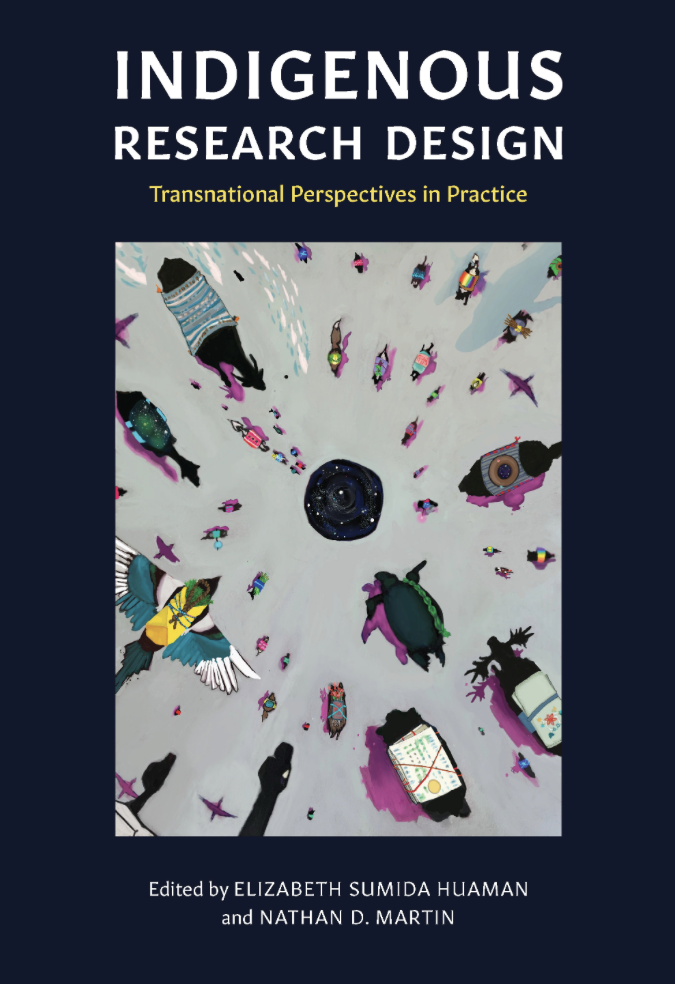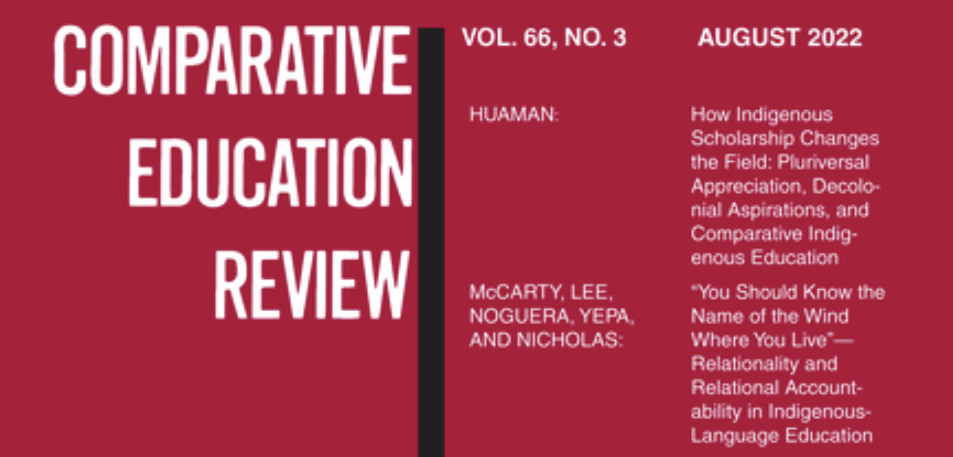Books and Journal Special Issues
Indigenous research design: Transnational perspectives in practice (2023)
Indigenous Research Design is an interdisciplinary text that explores how researchers reimagine research paradigms, frameworks, designs, and methods. Building upon the theories and research teachings presented by Indigenous Peoples in Indigenous Knowledge Systems and Research Methodologies, editors Elizabeth Sumida Huaman and Nathan D. Martin present practical formations and applications of Indigenous research for a variety of community, student, professional, and educational projects.
Comparative Indigenous education (2022)
As a project of state political and economic agendas, the schooling of Indigenous peoples has historically tended to reflect everyone else’s values, standards, and objectives but our own. However, for Indigenous communities, education is part of an array of long-term self-determination strategies that serve Indigenous autonomy, which is undergirded by Indigenous knowledge systems that encompass the political, economic, environmental, health, social, and cultural lives of Indigenous communities. Accordingly, Indigenous education in its many designs is founded in Indigenous struggles for interlinking forms and realizations of justice that recognize environmental dignity as indivisible from human life. Furthermore, the philosophies and enactments that sustain Indigenous autonomy in one place are never removed from other Indigenous places and the efforts of their people. This bridging across Indigenous worlds and our distinct and collective decolonial and interepistemic meanings of education constitute comparative Indigenous education, the focus of this themed issue.
Indigenous knowledge systems and research methodologies: Local solutions and global opportunities: (2020)
Bringing together researchers from geographically, culturally, and linguistically diverse regions, this book offers practical guidance and lessons learned from research projects in and with Indigenous communities around the world. With an aim to examine issues of power, representation, participation, and accountability in studies involving Indigenous populations, the contributors reflect on their experiences conducting collaborative research in distinct yet related fields. The book is anchored by several themes: exploring decolonizing methodological paradigms, honoring Indigenous knowledge systems, and growing interdisciplinary collaboration toward Indigenous self-determination.
Indigenous women and research: Global conversations on Indigeneity, rights, and education (2019)
We are Indigenous women of two different generations witnessing changes and continuities in the places that matter most to us. We have been doing research in our own villages and elsewhere and writing about and with our people, which are experiences that require reflection (of what we see and hear), circumspection (regarding knowledge seeking and dissemination), and action (contributing to transformation). Thus, this special issue is also the result of our questions as Indigenous women researchers seeking to learn how others define self-determination and navigate whose interests are represented, as well as through what lenses we process our research and how other Indigenous women see themselves in relation to community and the global social, cultural, and political movement of Indigenous self-determination.
Indigenous knowledges and learning: Vital contributions towards sustainability (2019)
In this special issue we rethink dominant discourses of development, globalization and sustainability, focusing on local Indigenous ideas, practices and visions of education that hold direct benefit for Indigenous peoples and broader impacts for all peoples. These contributions exemplify global diversity and respond to a critical question posed at the height of globalisation discourses and still relevant today: “Education for what will prevail in the globalization age?” (Stromquist and Monkman 2000, p. 21). In an era marked by widening economic and education disparities, and increasing environmental, social and political precarity (Grande 2018), Indigenous and other non-dominant peoples are rendered most vulnerable. Within the scope of the regions and peoples represented in this issue, we aim to counter that precarity through a critical global dialogue on the significance of Indigenous knowledge systems to education for a sustainable future. (Co-Edited with M. Tom & T.L. McCarty)
Indigenous innovations in higher education: Local knowledge and critical research (2017)
This edited volume is the result of a collaborative project of Indigenous graduate education training and higher education-tribal institution partnerships in the southwestern United States. We feature the work of interdisciplinary scholars writing about local peoples, issues, and knowledges that demonstrate rich linkages between universities and Indigenous communities. Collectively, as Indigenous peoples writing, this work takes the opportunity to explore why and how Indigenous peoples are working to reframe dominant limits of our power and to shift educational efforts from the colonial back to an Indigenous center. These efforts reflect a conscientious practice to maintain Indigenous worldviews through diverse yet unified approaches aimed at serving Indigenous peoples and places.
Indigenous innovations: Universalities and peculiarities (2015)
Rooted in diverse cultures and in distinct regions of the world, Indigenous people have for generations created, maintained, and negotiated clear and explicit relationships with their environments. Despite numerous historical disruptions and steady iterations of imperialism that continue through today, Indigenous communities embody communities of struggle/resistance and intense vitality/creativity. In this work, a fellowship of Indigenous research has emerged, and our collective intent is to share critical narratives that link together Indigenous worldviews, culturally-based notions of ecology, and educational practices in places and times where human relationships with the world that are restorative, transformative, and just are being sought.






